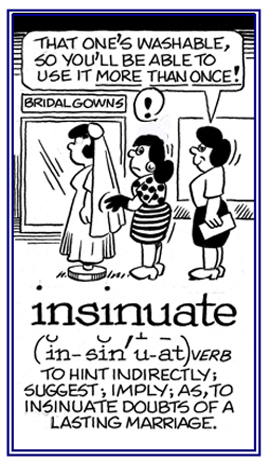You searched for:
“insinuate”
infer, imply, insinuate
infer (in FUR) (verb)
To come to a conclusion based on facts or observations; to conclude from certain evidence (literally, "to bring in", "to deduce"): Trudy and James could infer that there was a forest fire when they saw so much smoke on the horizon.
imply (im PLIGH) (verb)
To suggest a consequence rather than to make a clear statement: As chairman, Douglas seemed to imply that the meeting was over without actually saying it.
insinuate (in SIN yoo ayt") (verb)
1. To insert something into a context with an indirect suggestion: Gerald appeared to insinuate that the man was dishonest by questioning his integrity.
2. To gradually make oneself a part of a group, a person's life, etc.; often by behaving in a dishonest way: Shirley stood next to the speaker hoping to insinuate herself into the conversation.
2. To gradually make oneself a part of a group, a person's life, etc.; often by behaving in a dishonest way: Shirley stood next to the speaker hoping to insinuate herself into the conversation.
Roger has managed to insinuate himself into the city's highest social circles.
Speakers and writers imply; listeners and readers infer from what the speaker has implied.
Careful speakers and writers distinguish between these two words, using imply to mean, "to indicate without saying outright"; and infer to mean, "to draw a conclusion by reasoning".
Sam's warm smile implied that he was pleased to see us.
We inferred from Sam's warm smile that he was pleased to see us.
Imply, Infer
What I imply, I hint. What you infer
Is what you think I hinted. Better, madam/sir,
To say "hello" in error for "good-bye"
Than to say infer in error for imply.
Is what you think I hinted. Better, madam/sir,
To say "hello" in error for "good-bye"
Than to say infer in error for imply.
This entry is located in the following unit:
Confusing Words Clarified: Group I; Homonyms, Homophones, Homographs, Synonyms, Polysemes, etc. +
(page 2)
insinuate (verb), insinuates, insinuated, insinuating
1. To hint at something unpleasant or to suggest it indirectly and gradually.
2. To introduce oneself gradually and cunningly into a position; especially, a place of confidence or favor.
3. To suggest slyly: Shirley insinuated that the boys were lying.
4. To introduce or to insert (oneself) by subtle and artful means.
5. Etymology: from Latin insinuatus, insinuare "to bring in by windings and curving, to wind one's way into"; from in-, "in" + sinuare, "to wind, to bend, to curve", from sinus, "a curve, a winding".

© ALL rights are reserved.
Go to this Word A Day Revisited Index
2. To introduce oneself gradually and cunningly into a position; especially, a place of confidence or favor.
3. To suggest slyly: Shirley insinuated that the boys were lying.
4. To introduce or to insert (oneself) by subtle and artful means.
5. Etymology: from Latin insinuatus, insinuare "to bring in by windings and curving, to wind one's way into"; from in-, "in" + sinuare, "to wind, to bend, to curve", from sinus, "a curve, a winding".

Go to this Word A Day Revisited Index
so you can see more of Mickey Bach's cartoons.
This entry is located in the following unit:
sinu-, sin-
(page 1)
